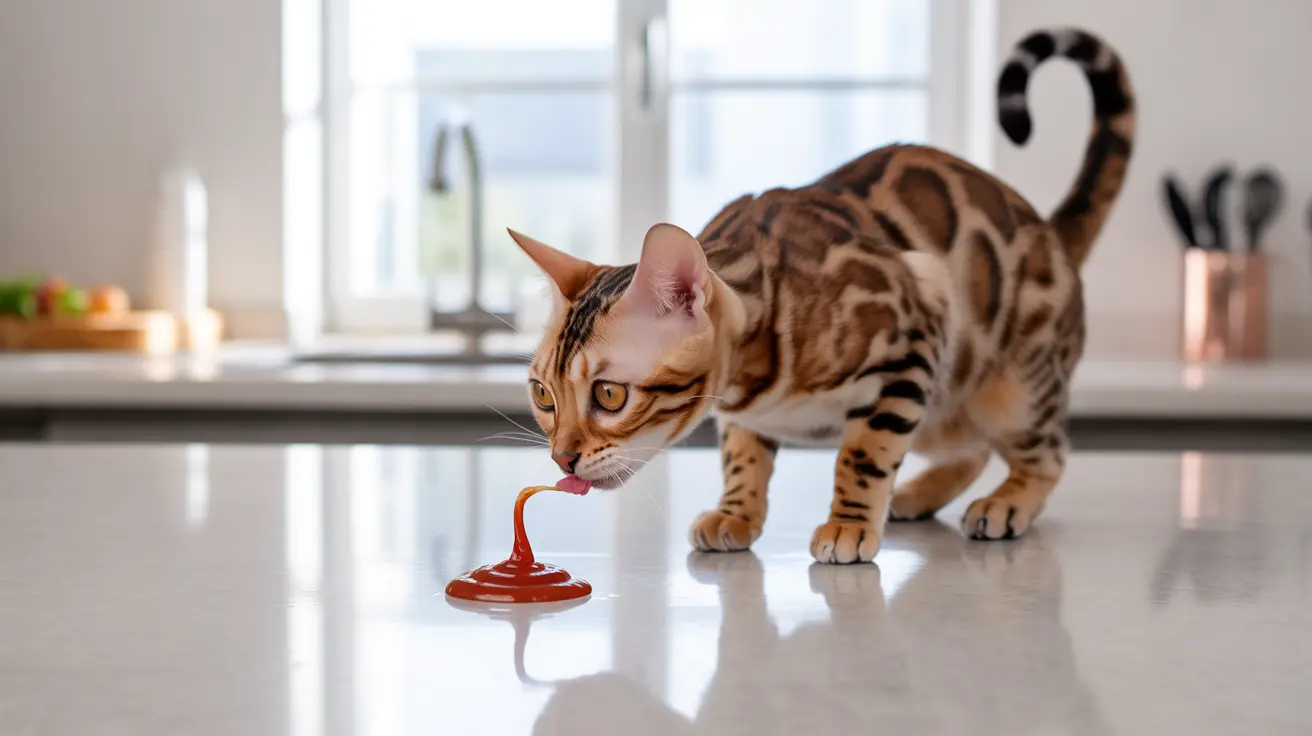If you've ever caught your cat showing interest in your plate of fries with ketchup, you might wonder about the safety of this common condiment. The short answer is no - cats should not eat ketchup. This popular condiment contains several ingredients that can be harmful or even toxic to our feline friends.
Understanding why ketchup is dangerous for cats is crucial for responsible pet ownership. Let's explore the risks associated with ketchup consumption in cats and what you should do if your pet accidentally ingests this condiment.
Dangerous Ingredients in Ketchup for Cats
Toxic Allium Components
Commercial ketchup typically contains garlic and onion powder, both members of the Allium family. These ingredients are particularly toxic to cats, with garlic being approximately five times more dangerous than onion. Even small amounts can lead to serious health complications.
High Sodium Content
The excessive salt content in ketchup poses another significant risk. Cats are sensitive to sodium, and overconsumption can lead to salt poisoning, causing severe dehydration and potentially life-threatening complications.
Sugar and Artificial Sweeteners
As obligate carnivores, cats lack the necessary enzymes to properly process sugars. The high sugar content in ketchup can contribute to obesity, diabetes, and dental problems. Some ketchup varieties containing artificial sweeteners like xylitol may pose additional risks.
Health Risks of Ketchup Consumption in Cats
Immediate Concerns
Even small amounts of ketchup can cause immediate gastrointestinal upset in cats, including vomiting and diarrhea. The combination of acidic tomatoes and various additives can irritate your cat's digestive system.
Long-term Health Effects
Regular exposure to ketchup ingredients can lead to chronic health issues, including:
- Heinz body anemia from garlic and onion exposure
- Kidney problems from excess sodium
- Dental decay from sugar content
- Digestive system inflammation
What to Do If Your Cat Eats Ketchup
Emergency Response
If your cat consumes ketchup, monitor them closely for signs of distress. Contact your veterinarian immediately if you notice:
- Lethargy or weakness
- Pale or yellow gums
- Vomiting or diarrhea
- Excessive thirst or urination
- Unusual behavior or disorientation
Prevention Strategies
Keep ketchup and other condiments safely stored away from your cat's reach. Clean up any spills immediately, and never intentionally feed ketchup to your cat, regardless of the amount.
Safe Alternatives for Cats
Instead of human condiments like ketchup, focus on providing your cat with appropriate treats designed specifically for felines. Consult with your veterinarian about safe treat options that complement your cat's regular diet.
Frequently Asked Questions
Is it safe for cats to eat ketchup or tomato-based sauces?
No, ketchup and tomato-based sauces are not safe for cats. They contain multiple ingredients that can be toxic to felines, including garlic, onions, and excessive salt.
What harmful ingredients in ketchup should cat owners be aware of?
Cat owners should be aware of garlic and onion powders (toxic to cats), high sodium content, sugars, artificial sweeteners, and various preservatives and additives that can harm cats.
What are the signs of ketchup toxicity in cats?
Signs include lethargy, pale or yellow gums, weakness, vomiting, diarrhea, excessive thirst, and unusual behavior. Severe cases may present with anemia or neurological symptoms.
Can a small lick of ketchup harm my cat, or only large amounts?
While a single small lick is unlikely to cause serious harm, even small amounts contain potentially toxic ingredients. It's best to prevent any ketchup consumption by cats.
What should I do if my cat accidentally eats ketchup?
Monitor your cat closely for adverse reactions and contact your veterinarian immediately if you notice any concerning symptoms. Keep track of the amount consumed and when it happened.
Remember, the best approach to ketchup and cats is prevention. Keep this and other human condiments away from your feline friends and stick to veterinarian-approved foods and treats for their safety and well-being.






